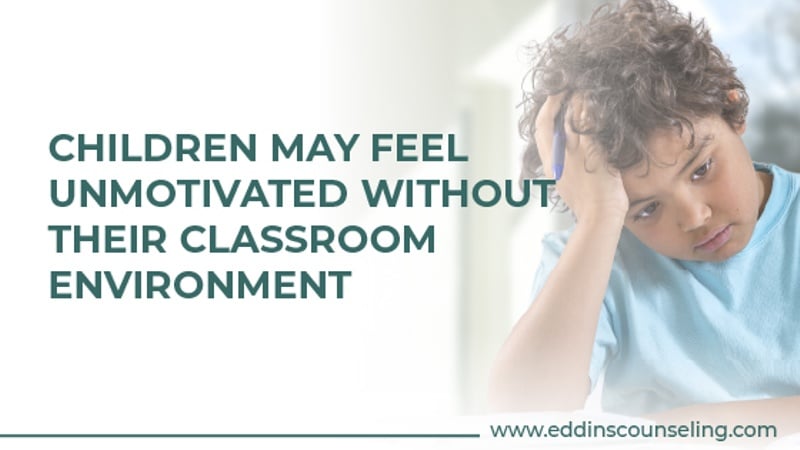December 30, 2020
How to Help Your Child Cope with At-Home Learning
Written by Rachel Eddins
Posted in Parenting & Family and with tags: child counseling

Parents, guardians, and children are struggling to adjust to a new normal.
The COVID-19 pandemic has caused widespread school closures and thrust children everywhere into an at-home learning situation. For some parents, this may mean juggling a career, housework, and now, a new level of responsibility for their child’s education.
At-home learning during a pandemic can be a stressful experience for anyone, but more intense feelings of stress and anxiety can crop up for some children without the right support.
While at-home learning may not be ideal for your family, with the right tips, you can help your children cope with this time at home and make the most of it together.
Stay Connected with Their School
Most schools provide some form of virtual lessons and activities, and there are also many other online platforms offering free learning opportunities. Find out how to best keep up with assignments from your child’s school and if the school is offering any additional resources, like meals or technology.
Make sure to read all communications you receive.
Reach out to the staff if you have any concerns about how your child is coping and behaving when it comes to learning and how they’re keeping up with their assignments. Your child’s teacher may have tips or tricks to offer you insight into how your child works best in the classroom.
Help Them Develop Healthy Coping Skills
Teach your child deep breathing exercises for when they feel overwhelmed. Deep breathing is a powerful tool to help calm the nervous system.
Take time to do it together. Celebrate the little things and focus on the positive.
You’re able to spend more time together as a family, so use this time together to connect and make it as fun as possible. Play word games during the day, do family projects, go outside, and exercise together.
Allow older children to stay connected with their friends virtually. Let your child ask questions and answer them as honestly as possible using age-appropriate information.
Let your child know it’s okay to come to you with concerns and fears. Doing so will help your child feel more empowered and less fearful.
|
|
Create your Lesson Plan
Create a routine for learning and stick to it as much as you can. Having a regular schedule is important for providing a sense of predictability and well-being.
It can also help children feel more in control and calm. Routines help children know when it’s quiet time, when they can connect virtually with friends, and when they can expect to have downtime.
This extra time at home is a great time to get creative with lessons as well. Pull out the legos to help your child learn math and patterns, or make a matching game to help them study their vocabulary words.
Children may feel unmotivated without their classroom environment. To help them stay motivated, set some attainable goals, and celebrate when your child achieves them.
Set up small rewards that can be awarded easily, like letting them watch their favorite movie, play word games during the day, or pick what’s for dinner.
Rewards like these may be just what your child needs to help them get through a challenging assignment.
Handling Behavior Problems
With your child learning at home, you may experience more behavioral issues than before. Try to keep in mind that children often misbehave as a way to relieve built-up frustration.
Try to redirect your child to a different activity when they start to misbehave. They may be getting restless if they’ve been working on the same task for a while.
Get creative with your discipline. If your child isn’t listening, have them do a task that helps them understand what they’re doing wrong, like drawing a picture.
Sometimes, rewarding your child’s good behavior is the best way to prevent bad behavior. During this stressful time, it can help to frequently reward your child’s good choices to show them that their hard work is recognized.
Be a Role Model and Have Fun Together
Children are always watching and will follow your reactions and react accordingly. If you’re feeling stressed, acknowledging the problem, and coming up with ways to work through it can help teach kids problem-solving skills.
It’s not often that parents get this much time to share with their children, so use this time to make memories and have fun together.
Follow the guidelines for your area, but plan plenty of activities for the whole family to enjoy.
- Get outside and have a picnic,
- Build a fort,
- Sit down and play word games during the day, or
- Use word tools for kids to help them unscramble the letters
Read more: Why Getting Outside is Good for Your Kids
Reach out to a Professional for Additional Support
These tips will help make your and your child’s at-home learning time a positive experience, but as always, if you have any concerns, reaching out to a counselor can help.
Parent Support Group
We also offer a Parenting Support Group to help parents with children that are struggling emotionally or relationally.
Utilizing Parent-Child Relationship Training (CPRT), this 10-week program will help parents build stronger relationships with their children. Learn more about this program here.
Mother’s Support Group
Mothers can gain parenting support through our Motherhood and Postpartum Support Group.
This group will delve into motherhood & identity, transformation through self-care, creating a personal support system, managing energy, reducing perfectionism, and owning personal power. Read more here.
Give us a call today at 832-559-2622 to learn more about our parenting, child, teen, and family counseling services, or book an appointment online.




















